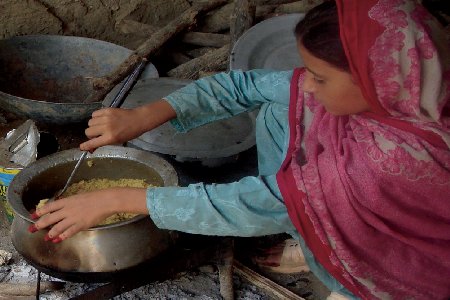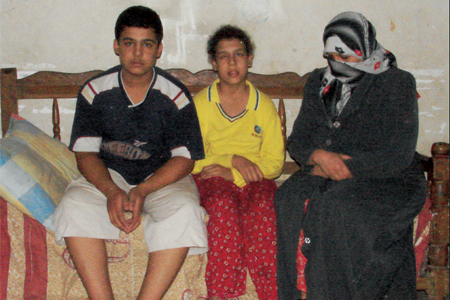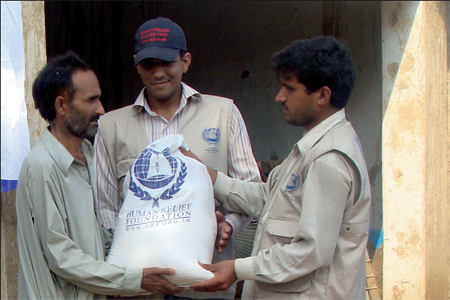
Relief for Collective Suffering
Issue 61 October 2009
Providing support to those displaced as a result of disaster, the Human Relief Foundation has had a global impact for over eighteen years. Ayman Khwaja reports.
Each year, widespread damage brought on by natural and man-made disasters increases at an unprecedented level. It has taken the collective effort of many charities and relief organisations to instil some form of composure in situations of chaos and upheaval. Sometimes at enormous cost. As I sit to write this, the Bradfordbased Human Relifef Foundation (HRF) have reported that one of their aid workers in Iraq has been shot dead. It underlines for me the immense sacrifices carried out daily by aid workers across the world. Since its establishment in 1991, HRF has expanded its relief work from Iraq during the Gulf War to many countries, including Somalia, Chechnya, Bosnia, Kashmir, and Bangladesh. Committed to providing aid whenever there is a major loss of life, material damage and physical, psychological and social suffering , the HRF has in recent years focussed its efforts on wartorn Gaza and the displacement of Pakistani refugees in Swat.
Gaza Strip, Palestine
HRF is considered to be one of the primary UK charities in Gaza since the crisis in December 2008, utilising over £250,000 in an attempt to provide aid. An influx of refugees to this narrow strip of land following the Arab-Israeli war of 1948 meant that Gaza became one of the most densely populated areas on earth. Over half of the refugee population live in eight UN-administered camps and of the remaining dwellings 20% have no sewage systems, resulting in waste flowing in open channels along the roads. For a piece of land that measures only 360 square kilometres, this is a colossal health risk for the 1.5 million (registered) residents. Alongside this, in early 2009, Gaza suffered a two-week bombardment from Israel resulting in mass civilian casualties, most of whom were women and children. The exact severity of this suffering, however, remains unimaginable to those of us looking on from miles away.
The story of Dalal is one that provides some perspective. A young girl in her teens, Dalal lost her parents and her three brothers during the bombardment. After spending the afternoon visiting her grandmother, Dalal returned to discover the wreckage of what was once her home, with her family buried beneath the rubble. Dalal’s is one of many similar stories and yet her experiences reiterate the reality of our world: suffering is collective. The Human Relief Foundation is committed to relieving the plight of people everywhere, in whatever way they can. “How wonderful it is that nobody need wait a single moment before starting to improve the world,” wrote Anne Frank.

Iraq
Out of Iraq’s pre-war population of 21million, 1.7million is thought to be displaced. The war has had enormous ramifications on multiple sectors of the country’s governmental institutions, from the economy to health, infrastructure and education. Many aid organisations have committed to help remedy the situation, but the sheer scale of devastation means that progress is slow. During the last five years, more than four million Iraqis have been made refugees and more than two million forced from their homes inside Iraq, with an additional two million fleeing to neighbouring countries mainly Syria and Jordan.
Statistics have shown that up to 60,000 Iraqis leave their home each month. Unintended as it may be, war zones are prone to causing civilian fatalities and Iraq’s has been one of monumental size. Hanna is one of those whose family has been devastated. Her two daughters, both under 10, caught an illness that left them with severe physical deformities. With their limited medical supplies, the doctors were unable to save the girls. Hanna’s grief was unbearable. Taking her remaining children - her son and eldest daughter, Hanna moved into rented accommodation. With no income except for charitable donations, she has scarcely able to maintain her home. Struggling to survive has become a way of life for Hanna and her children.
The HRF picked up Hanna’s story and brought it to the forefront, determined to not let her suffer in silence. Providing help is of course the fundamental function of an aid organisation. The HRF, however, want more than to temporarily supply relief; believing instead that it is imperative that stories like Hanna’s remain predominant in the minds of others; encouraging not only donations, but compassion in a time of environmental, social and political chaos in many places around the world.

Swat, Pakistan
After mounting pressure from the US government to tackle the Taliban insurgence in the North-West region of Swat, the Pakistani government forced millions to abandon their homes and seek refuge in neighbouring towns. The administrators of aid in Nowshera, Swabi and Mardan declared an emergency during the unexpected operation, resulting in schools and civil service buildings being converted into temporary shelters. More than 2.7million people were displaced from their homes, many of whom are still in refugee camps, unable to return with limited or no transportation available.
Due to the unexpected nature of the evacuation, the registration process for receiving relief from the government was left unused. Such was the fate of Qareebullah Shaikrullah who fled his home in Tehsil Kabal with his wife and two children desperately seeking shelter from the war. His village had become occupied by militants; the food supply was cut and survival became impossible. Having lost seven of his family members to the violence and unable to reach government registration centres due to the militant occupation, Qareebullah was left ineligible to get relief or seek refuge in any of the government-administrated camps.
The HRF, however, refused to base aid on a bureaucratic system during a time of such crisis. Recognising that over 85% of the displaced population were moving away from camps and towards the local people for food, clothing and shelter, the HRF provided sanitation facilities, medicines, food rations and other amenities. Through their commitment to improving living standards and ensuring that relief reaches those who truly are in need, the HRF managed to support approximately 122 Swat families. The HRF continue to undertake short-term rehabilitation and reconstruction. They are committed to working closely with local structures to ensure that relief reaches all those that need it without delay in areas of material devastation. Continuing to improve the living standards of those in need through long-term development programmes, their projects cover health, social and education issues. “So establish regular prayers; and give regular Charity; and obey the Messenger; That you may receive mercy.” Qur’an (The Light 24:56)
All things, material or otherwise do not belong to us: wealth is held by human beings in trust. The word zakat means both purification and growth. Our possessions are therefore purified when a part is set aside for those in need. This cutting back, like the pruning of plants, balances and encourages new growth. Charity is therefore not simply aid in the sense of helping another, but instead a balancing, purifying source in the world which at many times in history, has needed salvation from the very people who inhabit it.
For more information on the Human Relief Foundation, visit www.hrf.co.uk or call 01274 392 272.
Bookmark this |
|
Add to DIGG |
|
Add to del.icio.us |
|
Stumble this |
|
Share on Facebook |
|
Share this |
|
Send to a Friend |
|
Link to this |
|
Printer Friendly |
|
Print in plain text |
|


Comments
0 Comments